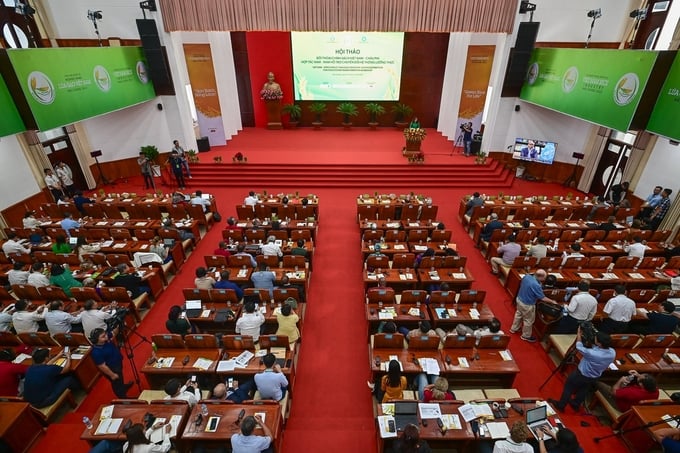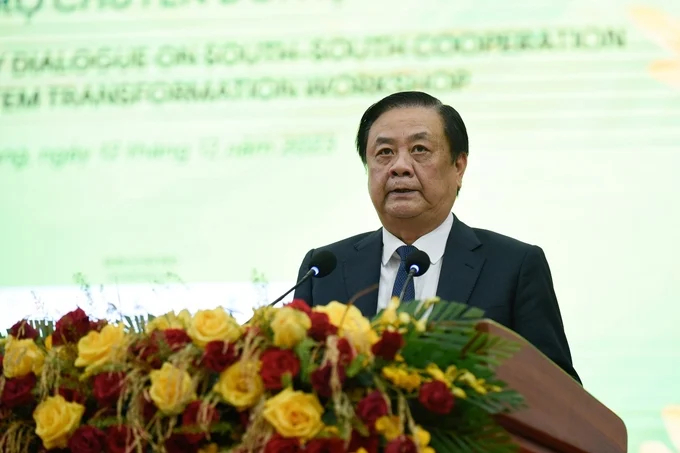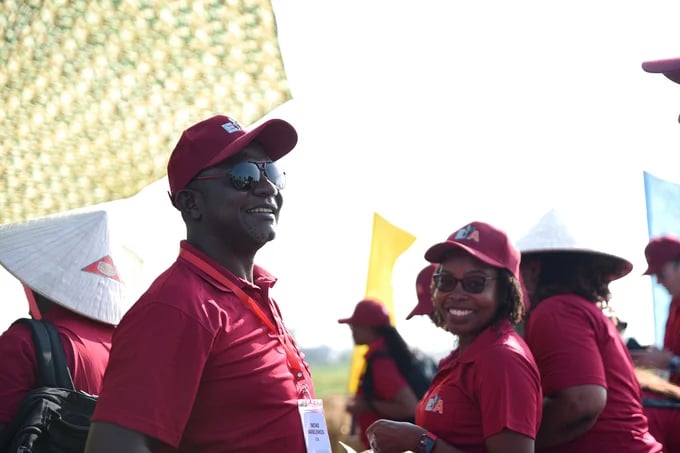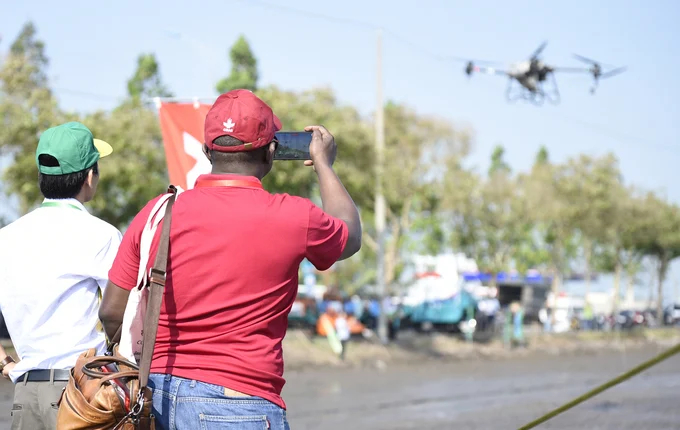June 19, 2025 | 00:11 GMT +7
June 19, 2025 | 00:11 GMT +7
Hotline: 0913.378.918
June 19, 2025 | 00:11 GMT +7
Hotline: 0913.378.918

Vietnam - Africa Policy Dialogue Workshop: South-South Cooperation (SSC) to support food system transformation" on the afternoon of December 12 in Hau Giang.
On the afternoon of December 12, the Ministry of Agriculture and Rural Development, the Food and Agriculture Organization of the United Nations (FAO), and the International Rice Research Institute (IRRI) co-organized the "Vietnam - Africa Policy Dialogue Workshop: South-South Cooperation (SSC) to support food system transformation”. To ensure global food security, the Workshop promotes the scale, methods, and effectiveness of technical cooperation between actors in the agricultural value chain.
Currently, countries around the world are facing complex challenges, becoming increasingly interdependent and requiring open dialogue. South-South cooperation is the exchange and sharing of development solutions, policies, and technologies between countries and organizations in the global South. Since the First Conference on South-South Cooperation (in Buenos Aires, 1996), this model has helped connect governments of developing countries with global financial partners.
The global agricultural industry faces countless challenges in addition to extreme climate change. Low rice yields, limited access to advanced technology, and difficult post-harvest management affect food security in Africa. Meanwhile, Asian rice-growing regions must deal with the problem of slow rice output growth due to land and water resource degradation.

Minister Le Minh Hoan: "Vietnam is always ready and committed to expanding South-South Cooperation."
In the opening speech, Minister Le Minh Hoan expressed: "Vietnam has been aiming to be a transparent - responsible - sustainable food producer and supplier, green agriculture with low emissions and to achieve Net Zero emissions by 2050. With its experience and the help of international donors, Vietnam is always ready and committed to expanding South-South Cooperation to support African countries to ensure food security and nutrition, aiming for green growth, sustainable development, and prosperity."
Recognizing the urgent need to transform food systems in Africa, the Workshop supports the development of an agricultural development roadmap through South-South and trilateral cooperation. With more than 50 years of friendship and an active learning process, the Vietnam - Africa Policy Dialogue Workshop will narrow the gap in geography, knowledge, and differences in farming traditions between the two regions.

Senior African scientists visited and worked in the Mekong Delta region during the Vietnam-Hau Giang International Rice Festival 2023.
Vietnam has supported 12 African countries with many successful examples in Guinea, Namibia, Mozambique, Senegal, Benin, Madagascar, Mali, Congo… The agricultural output of these countries has increased significantly thanks to the exchange of experiences and technology with Vietnam, receiving technical support from more than 2,000 experts and technicians in our country. Specifically, the agricultural projects Vietnam has participated in have increased crop productivity by 2-4 times, improving Africans' lives and solving the problem of food security in the region.
Jongsoo Shin, Director of the International Rice Research Institute South Asia Regional Centre, affirmed: "South-South Cooperation has the potential to revolutionize rice production in Asia and Africa. From the perspective of an international scientific research organization, we call on countries to exchange knowledge, resources, and the most advanced agricultural practices. Collaborative efforts will improve global food security, building a more sustainable future for millions of rice farmers."
The Vietnam - Africa Policy Dialogue Workshop not only strengthens the friendly and professional image of our country's agricultural industry. Vietnam wishes to contribute to hunger eradication, poverty reduction and rural agricultural development in the region.

African experts hope that the technology and techniques that Vietnam is applying will soon be transferred to their homeland.
"We hope to strengthen political relations, ensure the safety of Vietnamese businesses' investment and development environment abroad. The Ministry of Agriculture and Rural Development encourages Enterprises to promote bilateral trade with African countries through the international cooperation model," said Mr. Pham Ngoc Mau, Deputy Director of the Department of International Cooperation (Ministry of Agriculture and Rural Development).
In addition to the presentations at the Workshop, the discussion session on South-South cooperation brings a multi-dimensional perspective on the transformation of the food system. Senior experts from Vietnam, Sierra Leone, the Consultative Group on International Agricultural Research - CGIAR, Grow Asia, Middle East - Africa Institute, and representatives of Loc Troi Group discussed experiences and, innovative agriculture model.
South-South Cooperation (SSC) is essential in promoting sustainable development in Asia. This is the foundation for open exchange, expanding development solutions, knowledge, experience, policies, technology, and know-how between countries and organizations in the Global South. For the Food and Agriculture Organization of the United Nations, SSC is a complement to the North-South cooperation mechanism (between developed and developing countries).
Translated by Tuan Huy

(VAN) According to the Binh Thuan Department of Industry and Trade, in the first five months of 2025, Binh Thuan's dragon fruit export turnover increased by 20.65% compared to the same period last year.

(VAN) EU countries on Thursday gave final approval to new tariffs on fertilizer imports from Russia, a move aimed at cutting off revenue that could support Moscow’s war in Ukraine, despite concerns from European farmers.

(VAN) The working delegation from the Ministry of Agriculture and Environment conducted an important trip to the Netherlands to strengthen strategic partnerships and sustainable development in the agricultural sector.

(VAN) The letter ‘A Plea from the Ocean’ not only evokes emotion but also awakens the human conscience to the responsibility of protecting life on Earth.

(VAN) The Department of Agriculture in South Africa has announced the country’s first mass vaccination of poultry to prevent local birds from contracting avian influenza.

(VAN) Establishment of the Mekong Delta Regional Agricultural Linkage Center, aiming for a closed value chain, deep processing, trading platforms, and international market connectivity.

(VAN) Gia Lai province has recently recorded 460 rare species of animals and plants, contributing to forest conservation and biodiversity planning in the region.